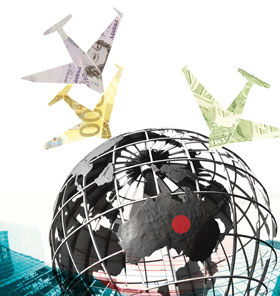Special investigation by Tracey Spicer
HASAN Mohammad Bin Laden -- one of Osama's brothers -- is playing Farmer Joe.
The head of the Middle-East Foodstuff Consortium is on a spending spree, targeting millions of hectares of farmland around the world to use as Saudi Arabia's "rice barn".
And next on his hit list is Australia.
Saudi Arabia, along with Abu Dhabi and Kuwait, want to buy more than $1 billion worth of Aussie farmland in a 21st century land grab; a global game of Squatter. Their mission is to own Australian cropping land to feed their own people. The big legal question is: Who owns what if there is a global food crisis?
"Everyone knows it's been going on," Suzanne Laing from the Australian Grain Growers Association said. "But we don't want to make any political comment."
A spokesman for one of the firms facilitating the deals, Coffey International -- speaking on the condition of strict anonymity -- said foreign companies have been covertly buying up adjacent farms in Australia for the past year. Most are under the $100 million mark, so they don't have to be approved by the Foreign Investment Review Board.
But confirming these sales is like finding a needle in a haystack.
GRAIN, an international sustainable-agriculture group, has identified at least five global firms -- acting on behalf of their governments -- who are trying to buy or lease Australian farms.
They are China's Suntime International Techno-Economic Co-operation Group, India's Ministry of External Affairs, Abu Dhabi's Al Qudra Holding, the Qatar Company for Meat and Livestock Trading (Mawashi) and the Bahraini company TRAFCO. A fortnight ago, Australia's biggest beef cattle company, AAco, sold a $67.4 million stake to a foodstuffs conglomerate from the United Arab Emirates.
The spending spree has initially been driven by a 75 per cent spike in food prices this decade.
While prices have since collapsed, the urge for food security hasn't ebbed, with produce prices tipped to rise 27 per cent by 2020.
"We can't eat auto parts," Richard Shin of Daewoo said recently.
Mr Shin is the boss of Daewoo's $6 billion project to carve a 1.3 million hectare farm out of Madagascar -- an area the size of Belgium.
Some Australian farmers, already concerned about the Chinese raid on our coal and oil supplies, believe the Department of Primary Industries is selling them out. They're still reeling from the sale of the rights to a 550 million-tonne mine, which the Shenhua Energy Company is gouging from agricultural land near Gunnedah in north-west NSW.
"We're very much an extinguishing breed, the family farmer," Liverpool Plains farmer Tim Duddy said.
The National Farmers Federation, far from protecting the man on the land, supports the foreign raids, citing "anecdotal evidence" of Chinese and Middle Eastern corporations taking majority shareholdings in local farms.
"We have no concerns at all," NFF president David Crombie said. "Foreigners bring in new dollars; it's good for Australian agriculture."
China, with more than 20 per cent of the world's population and only 9 per cent of its farmland, is the most aggressive player, acquiring two million hectares overseas since 2007.
The UN and World Bank cautiously supported this trend -- until they realised offshore farms are all about locking up food supplies, not helping the local farmers.
The founder of the Earth Policy Institute, Lester Brown, calls it the "dangerous politics of food scarcity" and "neo-colonialism".
"Strong increases in food prices and land scarcity are driving the corporatisation of Australian farms," said Audrey Riddell from market research firm IBISWorld.
So what happens in the event of a food shortage and subsequent riots, similar to those seen last year in Haiti.
"The international corporations have all the rights of a property owner," said lawyer Stephen Keim SC. "They can decide to whom they sell their food."
While many governments around the world fear a political backlash if details of these sales are made public, Canberra seems unphased.
"Australia has a well-developed set of guidelines against which particular foreign investments are screened," the Minister for Agriculture Tony Burke said. "Outside of those guidelines, there are no plans to further restrict when and to whom farmers sell their own properties."














